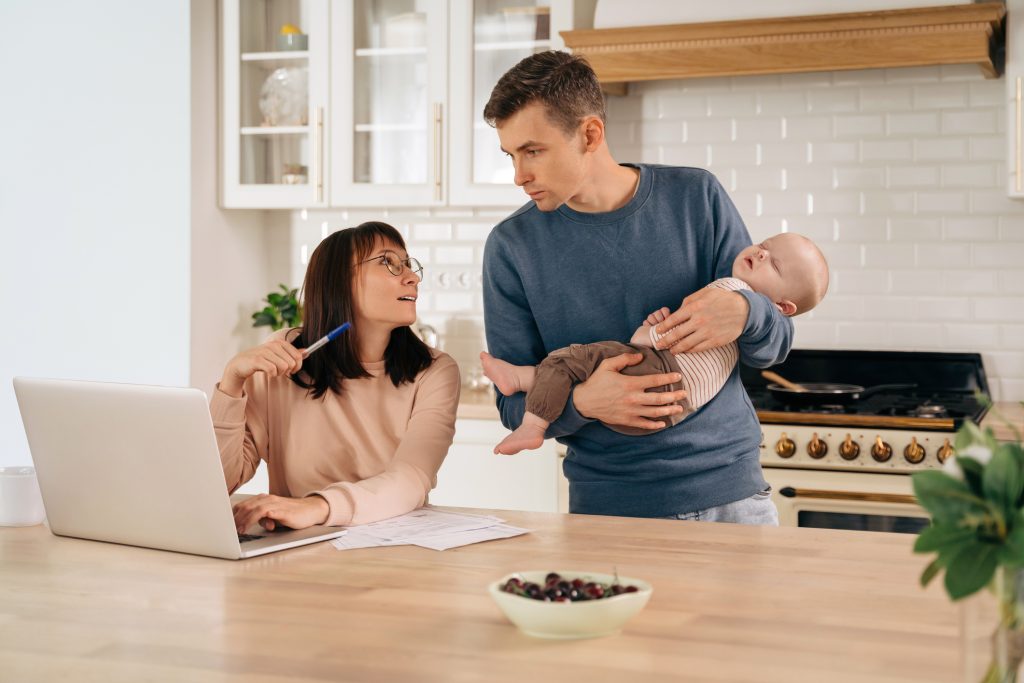“It just made sense”: The Controversial Decision To Share Parental Leave
RECRUITMENT • Jan 19, 2022

We’re all familiar with most of the challenges pregnant women face; sickness, exhaustion, swollen ankles. Yet, something many women aren’t prepared for is the judgement from others that seems to strike the moment they announce the happy news. From breastfeeding to sleep training, it seems everyone has an opinion they’re all too keen to share. One woman all too familiar with this is Kate Evans, Account Director with Warwickshire-based digital marketing agency Abstract. Kate and her partner Dane made the unconventional decision to share parental leave, with Kate opting to only take eight weeks off, and Dane taking seven months off to care for their daughter, Hallie. As Kate explains, “When I told people, I could see the looks of disapproval on their faces straightaway. They thought just because I was the mom, I needed to take a certain amount of time off work, and all I could think was: but why?”
“I love my job. I didn’t see any reason I should give that up”
Having spent six years working for Abstract, when Kate fell pregnant, she was very happy and established in her career. As an Account Director, she had plenty of responsibility too. Kate notes, “I’ve always been a very career-driven person. Even doing work experience at school, I always wanted to carry on with the job. I’ve always felt the need to earn money for myself so I didn’t have to rely on anyone else. So, when I found out I was pregnant, the idea of having nine months off just didn’t sit right with me. I didn’t want having a baby to impact my progress. I also didn’t want our family to be negatively affected financially. This decision just made the most sense all round, even if other people couldn’t understand it. I love my job, and I just didn’t see any reason I should have to give that up.”
Unfortunately, Kate’s fears that her career would be negatively impacted were not without merit. A study from London’s South Bank University revealed that almost half of mothers surveyed felt that maternity leave and pregnancy had placed them at a disadvantage within their jobs. The reasons for this range from facing microaggressions such as jokes related to ‘pregnancy brain’ and perceived incompetence, to taking time off for appointments and illness. Although Kate has a great relationship with her clients, she was also mindful of facing stigma. She explains, “Lockdown had hit by the time my pregnancy was showing, and to be honest I was relieved. Because now my meetings and presentations took place over Teams or Zoom, no one could see my bump. My job’s all about relationship building, so I did worry that clients would panic that I was abandoning them. I was also mindful of the perception that I wouldn’t be able to perform my job as well now that I was pregnant.”
The decision wasn’t a simple one for Dane, either. Coming from a corporate background, he was mindful of facing judgement from colleagues and senior management. Despite the fact that men are legally entitled to one or two weeks of paternity leave by law, incredibly, only 27% actually take it. Dane’s decision to take seven months off, then, is practically unheard of. Kate notes, “Even though Dane knew he would love the extra time with the new baby, it was by no means an easy decision for him, and he was very mindful of other people’s perceptions. However, it worked out well for us, as he was looking to adapt and change his career slightly anyway, so the break gave him time to think. It’s just crazy that most men don’t get that kind of break until they retire, and most don’t even take paternity leave at all.”
“More mothers would make the same decision if they received more support”
Although lockdown was a time of great stress and uncertainty for many, interestingly, Kate notes that the shift to home working actually turned out well for her. Previously, the Abstract team worked in the office, mainly due to the amount of technical equipment required to carry out creative work. However, as the pandemic hit, the team were forced to adapt. Kate reflects, “I never really worked from home before, and to be honest I hadn’t wanted to as I enjoyed being in the office. However, this turned out to be really beneficial for me with my pregnancy, as it meant I was able to schedule meetings and presentations around times of the day I knew I would be less likely to feel sick.” Kate also notes how her company’s progressive approach allowed her to feel confident in the decision to share parental leave: “My managing director is incredibly supportive, and was happy for me to continue working at home as long as I needed to. Had I been forced to go back into the office, our arrangement just would not have been possible. The company have also been great with me fitting my work around other commitments such as breastfeeding (which is a full time job in itself!) and taking Hallie to baby sensory classes. As long as I get the work done, they don’t mind. I truly believe more mothers would make the same decision if they received more support.”
Psychological research has indicated that whichever route women choose when it comes to maternity leave, it can seem like a no-win situation; they feel they’ll lose out if they take their full entitlement, and that they’ll be judged if they don’t. Kate’s advice, however, is simple: “Just put yourself and your family first, and don’t let other people’s assumptions get in the way. You don’t have to justify your decision to anyone – if you want to go back to work sooner simply because you enjoy it, that’s fine. In other professions, such as in the beauty industry, taking a short maternity leave is the norm and no one bats an eyelid. Yet, for some reason things seem to be different for office-based positions. I really hope Hallie never feels like her wants and needs need to take a backseat, and I’ll always make sure she realises that her decisions are hers alone.”
We’re making the world of work a happier place, one candidate at a time. We’ve hundreds of positions available in industries such as accountancy, human resources, marketing and digital, IT, and many more. Alternatively, you can search all our positions here, or register with us.





